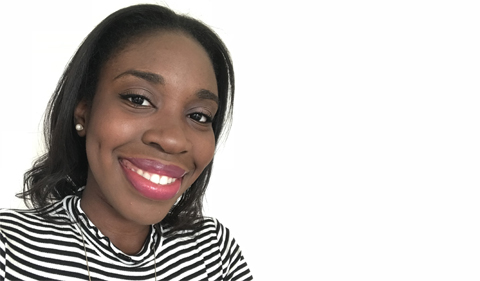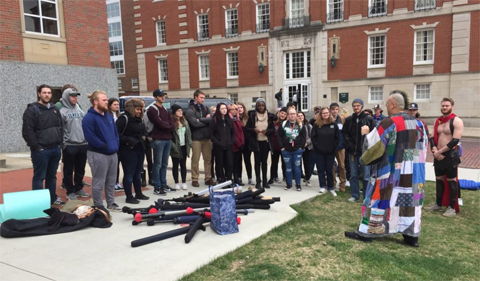Editor’s Note: The Happy Beginnings series features recent College of Arts & Sciences graduates who are getting started in careers, graduate school and service.
Ohio University alumna Precious Oluwasanya’s undergraduate journey in modern-day Athens covered the timeline—from ancient Rome and medieval times to Russia and World War II.
“The cool thing about History is that we learn so much, but I think the trouble is figuring out how to wrangle it all. You can apply your educational experiences in many ways and in many fields. It’s difficult to realize that we actually can do almost anything,” says Oluwasanya, who earned a B.A. in History Pre-Law in 2018 from the College of Arts & Sciences at OHIO.
She now finds herself working on an M.A. in European, Russian and Eurasian Studies at Carleton University in Ottawa, Canada.
“The program is fairly interdisciplinary and incorporates history, public policy, international relations, and cultural studies. I’m in the middle of a research project that analyzes the portrayal of Russia in Western film and television, and the potential effects or implications on international relations — it’s pretty interesting so far!” says Oluwasanya.
“The short-term plan, while finishing up my degree, is obtaining a temporary position through the work placement program next semester; likely as a policy analyst in the public or private sector. My current longer-term plan involves getting a Ph.D. in the next few years (but we’ll see)!”
Q. What skill or knowledge from your history major is proving most useful now?
A. Research skills! Learning how to conduct research is probably the most useful skill that I picked up as a History major. I learned how to search for materials from various sources, how to recognize and evaluate the quality/content of the sources, and how to effectively apply the information for a given project. Research skills definitely come in handy now, as I spend about half of my time conducting research (and I’d say that the other half goes towards writing, another vital skill from studying history).
The depth of historical study prepares us for different sorts of research. I’ve used these skills to conduct research in different settings, from an international development internship to security policy research. History majors learn how and when to narrow or widen the scope of our research, and we deal with different time frames, regions/countries, and types of material.
Q: Who were your favorite professors and how did they make an impact on your life?
A. I am tempted to list every single professor I encountered in the History Department and sing their praises, because they were all among the most knowledgeable and most supportive people I have met. The transition to college life was not so seamless for me, and it took a while to get comfortable with the university I would come to cherish. However, I absolutely adored my department from the start, and I never switched majors because of this. Our History Department is incredible. I had numerous “favorite” courses, and I was always hopping around time and place, because I loved all of it.
I always credit Dr. Jaclyn Maxwell’s Ancient Rome survey course for awakening my obsession with ancient history—and it certainly helped that she’s a genuinely lovely person who always made time to give me support and advice. I discovered Russia with Dr. Steven Miner and his incredible “USSR in WWII” course, which directly led me to my current program of study! Dr. Mirna Zakić was simply iconic. While I never actually took a course with Dr. Miriam Shadis, that didn’t stop her from giving me lots of guidance and time.
Dr. Kevin Uhalde was just amazing; I took several of his courses and loved them all. He always tolerated my endless questions. I especially enjoyed “Medieval History in Film and Literature,” as well as his Roman Law course. (I never imagined I’d find 2000-year-old legislation so fascinating.) One of my weirdest and funniest memories from OU was LARPing in front of Bentley Hall….
Dr. Robert Ingram was my academic adviser throughout my time at Ohio University, and he embodied his role in every way. Not only did his (brutal) Western Civ course introduce me to college history, but he supported me in countless ways — whether that was getting me in touch with alumni or contacts for guidance, or putting in a good word for me for opportunities, or pushing me to be less reclusive and take part in programs and events, and much more. I can’t say enough; he’s phenomenal.
The department is filled with exceptional people (and my cohort of students were such great people as well; I don’t have the space to even begin). In fact, my current thesis was inspired by Dr. Uhalde’s Medieval History/Film course: it was lots of fun and I carried that notion of film and society into my M.A. program. I was also lucky to have phenomenal TAs as well (a special shoutout to Alex Lovelace!)
Q: What’s the one thing you would tell a new OHIO student not to miss?
A. I might have been exceptionally nerdy and obsessive, but if you happen to lean that way, too, don’t limit yourself to one era: you could miss out on a fascinating time period or topic. Take courses across the board. Learn how to study and complete assignments in an efficient way that works for you: you don’t have to read the entire article (honestly), you don’t have to memorize all the dates (well, sometimes)…. You do have to learn how to structure an argument.
On jobs and careers: I think it’s best to have some idea of “what you want to do with your degree” (as irritating as the associated questions can get for a History major).
But in the current economic and social landscape (COVID doesn’t help), it’s less daunting and more practical to plan the next few years, rather than aiming for a “forever” goal.
The cool thing about History is that we learn so much, but I think the trouble is figuring out how to wrangle it all. You can apply your educational experiences in many ways and in many fields. It’s difficult to realize that we actually can do almost anything. Figure out what you’re good at and what interests you (and what bores you), go to events and interact with people, and learn about specific organizations, companies, and fields that you can see yourself fitting into.
If there’s any chance that you see yourself doing history for the long-run (M.A., Ph.D.), pick a relevant language early on and get good at it. Even if you don’t continue with history, language skills are always a major plus. And figure out how many hours you’re willing to spend writing papers.

















Comments